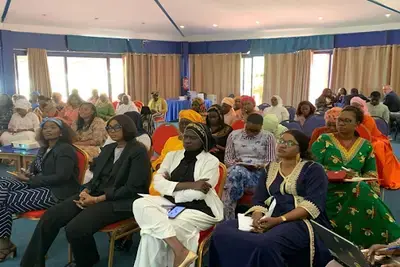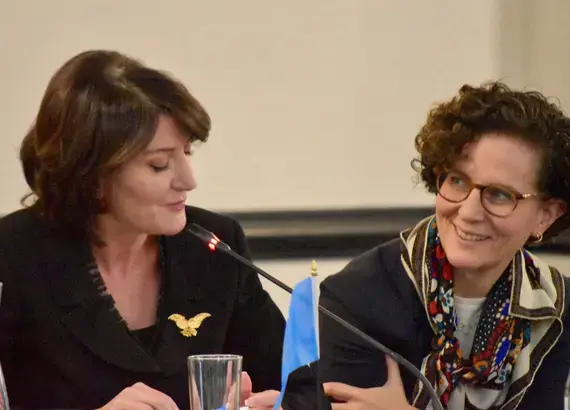
Former President of Kosovo Atifete Jahjaga (left) and former US Deputy National Security Advisor Mara Rudman share experiences at the symposium. Photo Credit: Jesper Frant
Success Story
International Symposium Shares Good Practices for Effective, Democratic Transitions of Executive Power
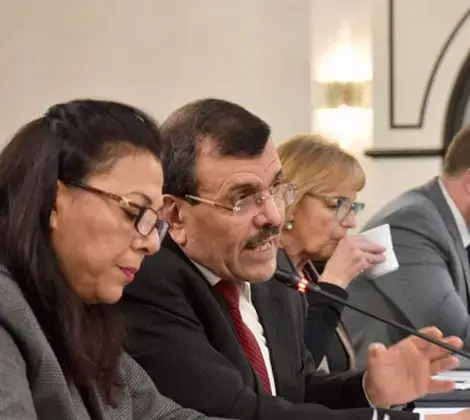
Former Tunisian Prime Minister Ali Laarayedh shares his experiences in transitioning into and out of the office of Prime Minister.
Effective handovers of power after democratic elections are becoming increasingly important, but also more challenging. Senior practitioners and experts on executive-branch transitions met in Montreal, Canada, on November 1 and 2, 2018, to share good practices for the smooth transfer of government control from one elected administration to another. The international symposium, co-hosted by NDI, the White House Transition Project and the Pierre Elliott Trudeau Foundation, included former heads of state and government, current and former ministers, chiefs of staff and other senior political staff, senior civil servants and scholars.
While the international development community has invested substantial resources in supporting democratic elections around the world, the symposium highlighted the need to provide greater attention to supporting the democratic transfers of power that follow. Smooth, effective executive transitions are critical to a country’s continued democratic and economic development, particularly in countries with limited traditions of democratic alternance in power and weak legal frameworks governing these transitions.
Citizen expectations following transfers of power are often extremely high. Incoming governments that are unprepared to begin governing immediately are not only less likely to meet citizen expectations but are also at risk of stalling on progress toward meeting their development goals. Too often, up to a year of the new administration’s term can be spent forming a government, leaving little time to govern before having to focus on the next election cycle.
“The need for greater support for effective handovers of power is becoming even more critical in many different contexts,” said Scott Hubli, NDI’s director for governance programs. “As social movements compete with traditional political parties in many countries, we see governments being formed by parties – or by factions within parties – that may have little previous experience in governing. In addition, increased political polarization and zero-sum politics in many countries have reduced cooperation between incoming and outgoing governments or administrations. Many new or restored democracies have limited experience with handovers of power, and the civil service may be politicized and lack the resources to support a smooth transition.”
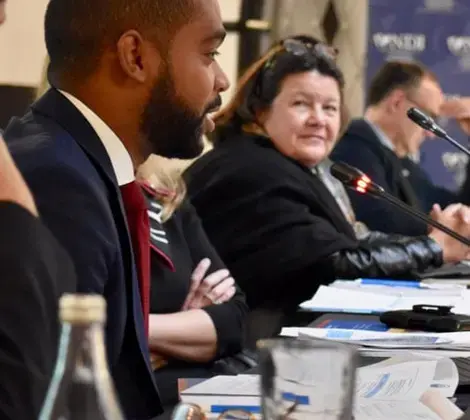
The two-day symposium brought together senior practitioners and experts from 19 countries to share best practices on effective transfers of executive power. The symposium highlighted the diversity of experiences between presidential and parliamentary systems; between countries that have experienced a succession of democratic transfers of power and those with limited experience; and between those with a developed legal framework and civil service support and those where each transition is ad hoc. The symposium also explored the particular challenges of transferring power to different types of coalition governments, especially where coalition agreements must be negotiated during a very short transition period.
Despite the diversity of experiences, there are also common challenges:
- building a basic level of trust and cooperation between incoming and outgoing governments;
- filling staff positions while also governing during the initial months of an administration;
- meeting high citizen expectations in the wake of an election;
- ensuring that the civil service respects the results of the election and supports the incoming administration; and
- ensuring continuity of government services, operations and policy-making during the transition.
A number of countries are currently working to develop legal frameworks to govern the transition process. “The lack of a legal framework [in Nigeria] creates a vacuum,” said Hon. Ayorinde Oluwasola Olabode, member of the Nigerian National Assembly. “The draft transitions law in Nigeria creates duties both for the outgoing government and the incoming government.” Dr. Ifedi Okwenna, director general of the Nigeria-based Save Democracy Africa organization, noted that the draft law provides for the establishment of a transitions committee with key officials from the incoming and outgoing administrations and senior civil servants, as well as the preparation and sharing of handover memos to the incoming administration. The intent of the process, is to “give the President the opportunity to start governing from day one,” Okwenna said.
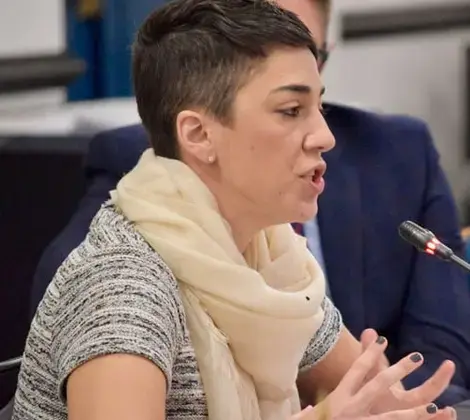
Natalie Gonnella-Platts, deputy director of the George W. Bush Institute Women’s Initiative, shares research on the role of first spouses conducted by the Bush Institute. Photo Credit: Jesper Frant
On one level, transitions involve building or sustaining a political culture of placing the national interest ahead of party interest, which includes ensuring a basic level of mutual respect and trust between incoming and outgoing administrations. Natalie Gonnella-Platts, deputy director of the George W. Bush Institute Women’s Initiative, presented research on first spouses and the role that they can play in helping to bridge political divides.
Building on its past transitions work and the materials coming out of the symposium, NDI is preparing a website of transition resources to support outgoing administrations, legislators interested in creating legal frameworks to support effective transitions, civil servants charged with assisting a ministry handover, or a new government working to build out its team. In addition, NDI has facilitated sharing of peer-to-peer experience, among countries or individuals that have are dealing with or have overcome similar challenges.
In supporting executive transfers of power, NDI has worked with a number of partner organizations, including the the White House Transition Project (WHTP) and the Tony Blair Institute for Global Change, both of which participated in the discussion. In other contexts, NDI has coordinated closely with the Global Leadership Foundation, an association of former heads of government whose mission is to provide confidential peer support to leaders of government. NDI is grateful to the National Endowment for Democracy for its partnership and support of this initiative.
One constant theme throughout the symposium was the difficulty of transitions. They pose challenges for all democracies – regardless of their level of democratic development or past transition experience. It was equally clear, however, that there are opportunities to learn from each other and share good practices across regions and borders.
The world is facing an increasingly complex set of developmental challenges. Developing a more effective transition process is one way that democracies can strengthen citizen trust in their democratic governments. An effective transition process is essential in responding to the will of the electorate without losing precious time governing due to protracted, ineffective handover processes.
